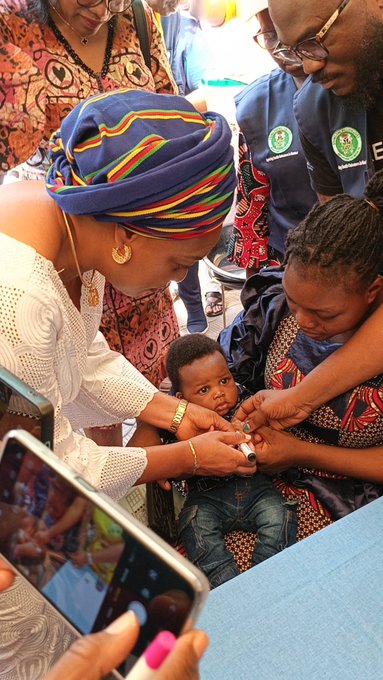Health
HEALTH CORNER: What You Need To Know About Peptic Ulcer Disease
Published
2 years agoon
By
Editor
Peptic ulcer disease (PUD) is a condition that affects the stomach and first part of the small intestine. It is characterized by open sores(wounds), known as “ulcers,” that form in the lining of these organs.
Peptic ulcer disease (PUD) affects four million people worldwide annually and has an estimated lifetime occurrence of 5−10% in the general population. Its frequency is reducing among young males and increasing in older females.
The most common cause of PUD is a bacterial infection called “Helicobacter pylori” (H. pylori), but it can also be caused by long-term use of nonsteroidal anti-inflammatory drugs (NSAIDs) such as Aspirin, Diclofenac, Ibuprofen, Puroxicam, or excessive acid production in the stomach in some disease conditions.
READ ALSO: HEALTH CORNER: What You Need Know About Chlamydia Infection, Prevention
The risk factors include alcohol abuse, smoking, prolonged use or use of high doses of NSAIDs, misuse of steroids such as Prednisolone and Dexamethasone, and exposure to high doses of ionizing radiation.
“Stress, carbonated soft drinks, and spicy foods do not cause ulcers but can make them worse.”
Symptoms of PUD can vary from person to person, but they commonly include:
1. Burning or gnawing abdominal pain, usually in the upper middle part of the abdomen.
2. Feeling full and bloated after eating.
3. Nausea or vomiting.
4. Loss of appetite.
5. Weight loss.
6. Dark or black stools (indicating gastrointestinal bleeding).
If a person has symptoms suggestive of PUD, it is important to seek medical attention for an accurate diagnosis.
A healthcare provider will take relevant history, perform a physical examination, and may recommend tests such as an upper endoscopy, a breath test for H. pylori, or blood tests.
Treatment for PUD typically involves a combination of medications and lifestyle changes. Medications may include proton pump inhibitors (PPIs) and antihistamines to reduce stomach acid production, antacids to neutralize already produced acid, and antibiotics to eliminate H. pylori.
FROM THE AUTHOR: HEALTH CORNER: Indian Hemp Benefits, Risk In Its Consumption
Lifestyle changes may include avoiding NSAIDs, alcohol, and smoking, as well as managing stress levels and eating a healthy diet.
In severe cases of PUD, complications like bleeding, perforation (a hole in the stomach or intestine wall), or obstruction may occur. These require immediate medical attention and may lead to hospitalization or surgery.
“Please do understand that PUD, just like Malaria, is curable with appropriate and adequate treatment, and not a life-long diagnosis. However, it can recur as many times as possible as long as the patient keeps exposing himself/herself to the causative agents or keeps indulging in behaviours that can trigger and/or worsen its symptoms.”
It is worth noting that while PUD can cause discomfort and complications, with proper treatment and management, most people can find relief from their symptoms and prevent recurrence.
It is important to follow the healthcare provider’s advice and attend regular follow-up appointments to monitor the condition.
Dr. Yeibake, Weriwoyingipre Silver is a Senior Registrar, Paediatrics, Federal Medical Centre, Yenagoa, Bayelsa State.
You may like
Health
LASG FLags Off Polio Outbreak Response Campaign
Published
6 months agoon
January 20, 2025By
Editor
The Lagos State Government, through the Lagos State Primary Health Care Board, has launched the 2025 Polio Outbreak Response Campaign, reaffirming its commitment to eradicating polio and safeguarding the health of its children.
The ceremony, held at the Simpson Primary Healthcare Centre, was led by the First Lady of Lagos State, Dr. (Mrs.) Claudiana Ibijoke Sanwo-Olu, represented by Mrs. Widad Jumoke Mustafa, a member of the Committee of Wives of Lagos State Officials (COWLSO).
In her address, the First Lady emphasised the state government’s proactive measures to keep Lagos polio-free, highlighting the critical importance of the campaign in preventing the debilitating effects of poliomyelitis, which can result in paralysis or death.
READ ALSO: IMPEACHMENT: Lagos Ex-Speaker, Obasa’s ‘Sins’ Revealed
The First Lady also called on parents, community leaders, and stakeholders to support the campaign by ensuring eligible children are vaccinated.
Targeting children aged 0-59 months, vaccination teams will administer the Oral Polio Vaccine (OPV) to prevent virus transmission.
Dr. Kemi Ogunyemi, the Special Adviser on Health, expressed gratitude to Lagosians for their continued cooperation in the fight against polio. While appreciating all healthcare workers and partners for their services, Mrs. Ogunyemi encouraged parents to present their children and wards for the exercise.
Also speaking, the Chairman of Lagos Mainland Local Government, Mrs. Omolola Rashidat Essien opined that Immunization is key in ensuring that children are kept safe from polio and other vaccine preventable diseases.
Dr. Abimbola Bowale, the Supervising Permanent Secretary, Lagos State Primary Health Care Board, who also spoke at the event, underscored the life-saving importance of immunization.
“All children aged 0-59 months need multiple doses of the polio vaccine to ensure full protection. Any child missed represents a potential risk for the poliovirus to spread. The vaccine is safe, effective, and crucial in keeping our communities polio-free,” he stated.
Dr. Bowale also outlined several strategies to ensure the success of the campaign, including fixed post teams stationed at primary healthcare centres and public health facilities, house-to-house visits, and a transit strategy to reach special locations such as places of worship, schools, motor parks, and other public venues.
The event concluded with Dr. (Mrs.) Claudiana Ibijoke Sanwo-Olu officially launched the campaign, marking a renewed effort to maintain Lagos State’s polio-free status.

The Lagos state suspected cholera cases have risen to 421.
The Commissioner for Health, Akin Abayomi disclosed this on his Instagram handle @profakinabayomi on Saturday.
“As of June 20, 2024, an additional four suspected cholera cases have been reported, as illustrated in the accompanying graph,” he wrote.
He noted that the Emergency Operations Centre in collaboration with all relevant partners is actively engaged in contact tracing, community-based surveillance, awareness campaigns, sample testing, and ensuring that confirmed cholera cases receive appropriate medical treatment.
READ ALSO: Two Suspects Arrested For Stealing Car From Mosque During Juma’at Prayer
On Friday, the commissioner confirmed 35 cases out of the 417 suspected cases and 24 deaths across 20 Local Government Areas in the state.
The cases were reported from Agege, Badagry, Ikeja, Mushin, Ajeromi-Ifelofun, Epe, Ikorodu, Ojo, Alimosho, and Eti-Osa.
Others were Kosofe, Oshodi-Isolo, Amuwo-Odofin, Ibeju-Lekki, Lagos Island, Shomolu, Apapa, Ifako-Ijaiye, Lagos mainland, and Surulere.
Cholera is a food and water-borne disease caused by ingesting the bacteria— Vibrio cholerae — in contaminated water and food. Cholera can cause severe acute watery diarrhoea, and the severe forms of the disease can kill within hours if left untreated.
In Nigeria, cholera is an endemic and seasonal disease, occurring annually mostly during the rainy season and more frequently in areas with poor sanitation.
READ ALSO: Police Arrest 28yr Old Suspected Cultists, Recover Gun In Delta Community
The World Health Organisation on Thursday announced a spike in cholera in several regions of the world, with almost 195,000 cases and over 1,900 deaths reported in 24 countries since the start of 2024.
WHO said the Eastern Mediterranean Region reported the highest number of cases, followed by the African Region, the Region of the Americas, the Southeast Asia Region, and the European Region.
The global health body, however, noted that there are no reported cases in the Western Region, according to its bulletin released on Wednesday.
It said it exhausted its global stockpile of Oral Cholera Vaccines by March but was able to exceed “the emergency target of five million doses in early June for the first time in 2024.”

By Silver Yeibake
Autism, commonly known as Autism Spectrum Disorder (ASD), is a neurodevelopmental disorder that affects communication, social interaction, and behavior. Autism is referred to as a spectrum condition since it can manifest in a variety of symptoms and abilities. While the actual cause of autism is unknown, evidence suggests that genetic and environmental factors interact to influence its development.
The risk factors include a sibling with autism, advanced age of parents, exposure to certain air pollutants and pesticides before birth, extreme prematurity, mothers with diabetes, immune system disorders or obesity, any difficulty with delivery leading to deprivation of oxygen to the baby’s brain, fever during pregnancy, lack of certain vitamins minerals during pregnancy, and certain genetic conditions, such as Down, fragile X, and Rett syndromes.
“Risk factors can not on their own cause a disease. However, they can increase the likelihood of that disease in a person.”
It is important to know that contrary to trending claims online, there is no scientific or medical evidence that vaccines or consumption of sugar are risk factors for autism.
READ ALSO: Kidney Stones: What You Need To Know
Autism is defined by difficulties in social interaction and communication. Individuals with autism may struggle to grasp social cues, maintain eye contact, and engage in typical back-and-forth conversations. Some people may also engage in meaningless, repetitive actions, such as hand-flapping or rocking, and have strong interests in specific areas.
It is essential to remember that autism is a lifelong diagnosis, but with early intervention and adequate care, people with autism can live fulfilling lives.
Autism treatment frequently includes behavioral therapy, speech therapy, occupational therapy, and social skills training. Each individual with autism is unique, thus interventions should be tailored to meet their personal needs and strengths.
In spite of the difficulties that autism can cause, many people with autism possess unique talents and abilities. Some people may succeed in fields such as music, art, mathematics, or programming, thus it is important for society to acknowledge and honor the qualities and achievements of people with autism.
In summary, autism is a complicated and diverse disorder that affects individuals in various ways. By raising autism knowledge, understanding, and acceptance, we can build a more inclusive society in which people with autism can thrive and attain their full potential.
Dr. Yeibake, Weriwoyingipre Silver.
Senior Registrar,
Faculty Of Pediatrics,
WACP
- Online Reports On Protest False, Intent To Tarnish Our Image – AAU Ekpoma
- Obi In Benin, Donates N15m To St Philomena School of Nursing Sciences
- What To Know About Rashidi Ladoja, The Next In To Become Olubadan
- Tension In Kano As Sanusi, Bayero Loyalists Clash Near Emir’s Palace
- Tension As FG Strips FAAN, NCAA, NAMA Of Revenue Collection Powers
- Flash Flood Warning: Sokoto, Edo, Akwa Ibom, 17 Other States At Risk In July — NiMet
- Trump Threatens Extra 10% Tariff On BRICS Nations
- Tiwa Savage Shares Emotional Moment With Son
- JUST IN: Gunmen Kill Policeman, Abduct Other In Imo
- INEC Announces Dates For Commencement Of Continuous Voter Registration In Osun
About Us
Trending

 Sports5 days ago
Sports5 days agoBREAKING: Liverpool Star Diogo Jota Is Dead

 Politics2 days ago
Politics2 days agoCoalition: Why Tinubu Must Not Sleep —Primate Ayodele

 Entertainment1 day ago
Entertainment1 day ago2Baba’s New Romance In Trouble As Natasha Fumes Over Loyalty Remark

 Metro5 days ago
Metro5 days agoNDLEA Arrests Warri Chief, Ayirimi Emami’s Brother For Alleged Drug Smuggling

 Sports4 days ago
Sports4 days ago5 ‘Big’ Recent Events Diogo Jota Had Before His Death

 Metro4 days ago
Metro4 days agoThree-storey Building Collapses On Lagos Island, Many Injured

 Politics3 days ago
Politics3 days agoAmaechi: I Will Resign As FCT Minister If… Wike

 Politics4 days ago
Politics4 days agoCoalition: Abure-led LP Gives Obi 48 Hours To Leave Party

 Metro3 days ago
Metro3 days agoVIDEO: Police Arrest Varsity Student For Stabbing Colleague, Demanding Ransom In Delta

 Politics4 days ago
Politics4 days agoADC, A Coalition Of Failed Politicians – Wike















